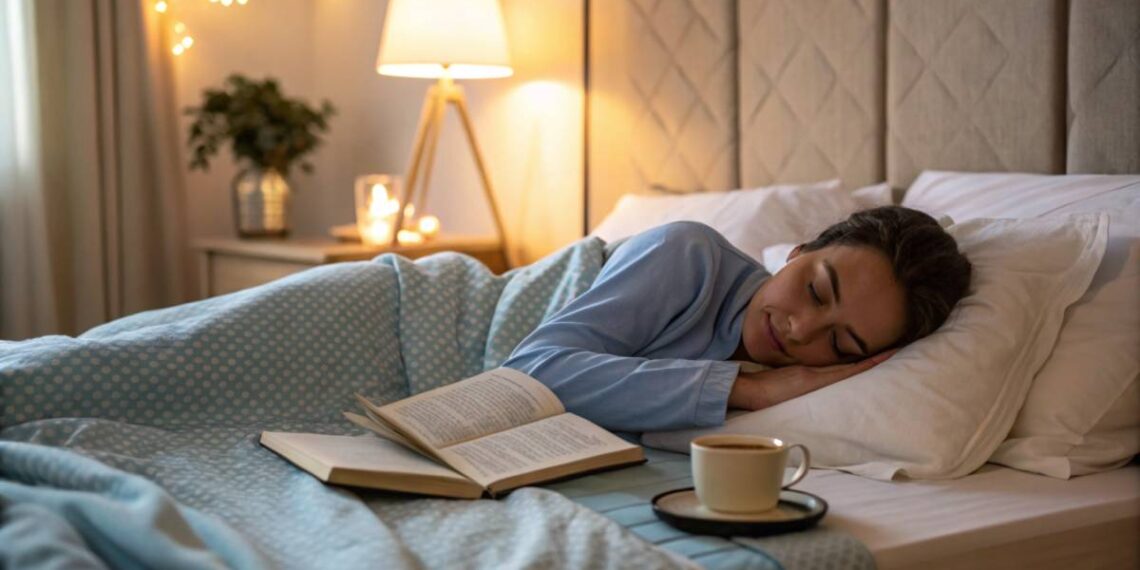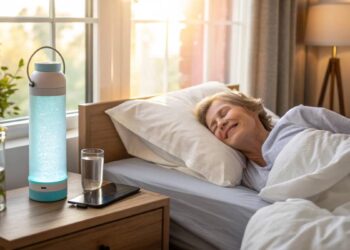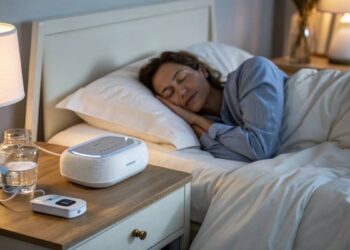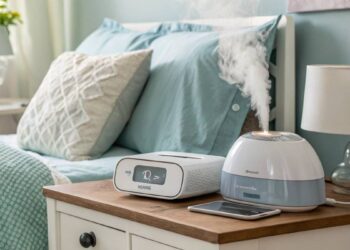Ever find yourself tossing and turning, desperately chasing sleep that seems just out of reach? You’re not alone. Insomnia and restless nights plague millions, but the solution may be simpler than you think: sleep hygiene. This essential guide unpacks practical, science-backed strategies to transform your bedtime habits, creating the perfect recipe for restful, rejuvenating sleep. Let’s dive in and unlock your ticket to Dreamland!
Key Takeaways
- What is Sleep Hygiene?: It’s the art of aligning your habits and environment to promote better sleep quality.
- Why it Matters: Poor routines can worsen insomnia, while good sleep hygiene combats it effectively.
- Practical Steps:
- Maintain a consistent sleep schedule.
- Adopt calming pre-sleep routines like reading or mindfulness.
- Limit stimulants like caffeine and alcohol close to bedtime.
- Sleep-Friendly Environment: Keep your room cool, dark, and tech-free for optimal rest.
- Stress Management: Techniques like yoga, meditation, and deep breathing can significantly reduce anxiety-induced sleeplessness.
- Professional Help: When all else fails, therapies like CBT-I and professional consultations can provide relief.
Understanding Insomnia
Got the snooze button blues? You’re not alone. Loads of folks just can’t catch those Z’s. Let’s break down what’s going on when you can’t get to sleep, what’s causing it, and why it feels like such a big deal in your life.
What Is Insomnia?
Insomnia is that pesky racer in your head that just won’t let you drift off. Whether it’s skipping your snooze time, waking up on the dot at 3 AM, or just plain tossing and turning, insomnia isn’t shy about crashing your nightly refresh. It can hang around for nights, weeks, or even decide to become a long-term guest. This sleeplessness affects your day, mood, and overall life vibes. For some curious reads on why you’re staring at the ceiling instead of dreaming, check out our piece on why can’t I fall asleep.
Common Causes of Insomnia
What’s keeping you counting sheep? There’s a bunch of reasons, often fitting neatly into these buckets:
| Cause | What’s Going On |
|---|---|
| Stress and Anxiety | Whether it’s job drama or just life, worries can keep sleep at bay. |
| Lifestyle Choices | Late-night espresso or impromptu party might not be your sleep buds. |
| Medical Conditions | Chronic pain or conditions like asthma can be stubborn night guests. |
| Medications | Some pills have labels that should read, “May cause restless nights.” |
| Age-Related Changes | As we age, so do our sleep patterns, often for the worse. |
| Sleep Disorders | Things like sleep apnea and restless legs aren’t doing you any favors. |
Wanna see how your jittery brain gets in the way of catching those Zzz’s? Dive into our read on insomnia vs anxiety.
Impact of Insomnia on Health
Stick with insomnia for too long, and things can get messy. Here’s how:
| Health Effect | The Lowdown |
|---|---|
| Mood Mix-ups | You’re more likely to get into a funk, with stress turning into gloom. |
| Brain Fog | Focus? Forget about it! Memory and alertness take a backseat. |
| Physical Woes | Expect unwanted pounds, high blood pressure, and immune hiccups. |
| Sleep Pressure | Sky-high sleep needs could make you drowsy when you least want it. More on this in our article on sleep pressure. |
Prioritizing some good sleep habits can throw insomnia a curveball. By sticking to a sleep hygiene checklist, individuals can pave the path to sweeter dreams and good health.
Importance of Sleep Hygiene
Taking care of your sleep habits is huge in beating sleep troubles. Good sleep hygiene means adopting certain habits to catch better Z’s and feel awesome.
“Sleep is the golden chain that ties health and our bodies together.” – Thomas Dekker
Definition of Sleep Hygiene
So, what’s this “sleep hygiene” all about? It’s everything from the rituals to the surroundings that set you up for a good night’s snooze. Think of it like a game plan for your sleep: comfy room, regular bedtime, maybe even a bedtime story or some chill-out time before you hit the sack. A handy checklist can guide folks in picking up sleep-friendly habits that boost how well they sleep.
Relationship Between Sleep Hygiene and Insomnia
Bad sleep habits can crank up insomnia, making it tough to drift off or stay dreamin’. Having a rowdy bedroom vibe or diving into intense stuff before bed messes with your beauty rest. Research backs this up: better habits = better sleep, especially for people wrestling with chronic insomnia. Improving sleep hygiene doesn’t just tackle insomnia but can also ease issues like anxiety and depression.
Benefits of Good Sleep Hygiene
Sticking to solid sleep hygiene has loads of perks:
| Benefit | What’s in it for You |
|---|---|
| Better Sleep Quality | Deeper, longer sleep with fewer “why-am-I-awake” moments. |
| Easier Bedtime | Calming bedtime rituals that say, “Nighty night.” |
| Daytime Perk-Up | Better focus, mood, and energy—the trifecta! |
| Fewer Sleep Issues | Healthy habits fend off stuff like insomnia. |
Folks who keep their sleep game strong usually wake up feeling like a million bucks and faceless sleep drama. Tips like sticking to a sleep routine, dodging caffeine late in the day, and chilling out sleep zones can supercharge healing sleep. Check out more about exercise and meditation as extra gears in your sleep toolkit. These habits lay down the groundwork for kicking sleep issues to the curb and leveling up your overall health.
Creating Your Sleep Environment
Setting the stage for sleep isn’t just about pulling up the covers and shutting your eyes. It’s about making your room as inviting as a fluffy pillow top. Whether you’re up all night with insomnia or busy with the demands of a new baby, tweaking your sleep space can have you dozing off like a contented feline. Here’s the lowdown on making your bedroom a sleep sanctuary.
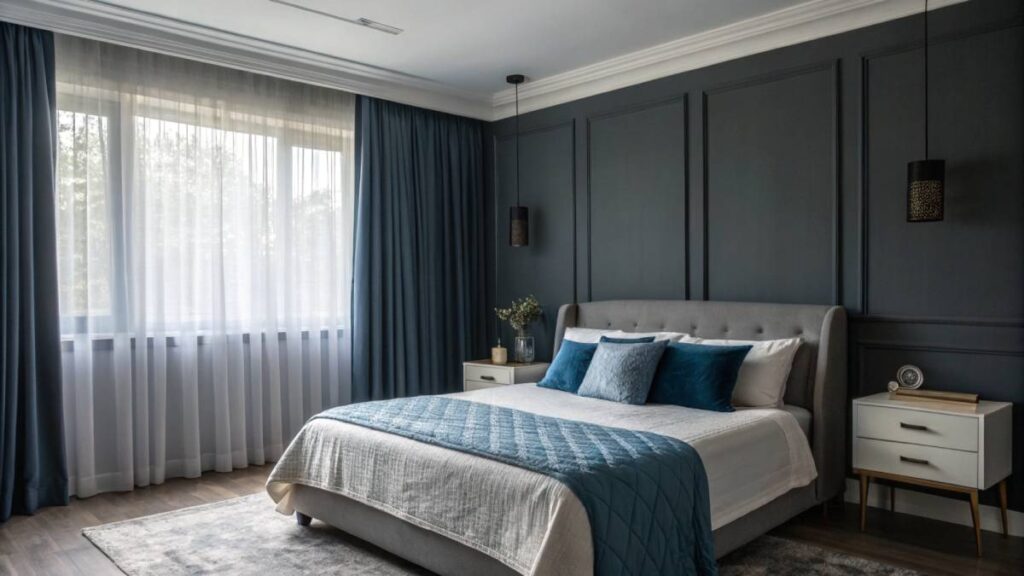
Optimal Room Temperature
Think of your bedroom like Goldilocks’s porridge—the temperature needs to be just right. Most folks snooze best when the room is cooler, somewhere between 60°F to 67°F (that’s a comfy 15°C to 20°C). Lower temperatures kick off your internal snooze alarm, reminding your body it’s lights out time.
| Temperature (°F) | Comfort Level |
|---|---|
| 60-67 | Perfect for Sleep |
| 68-72 | Perfectly Cozy |
| Above 72 | Toss and Turn Zone |
Tweaking the thermostat or switching on a fan can help hit that sweet spot. If you’re still struggling, consider breathable bed buddies like cotton sheets to help manage the heat.
Importance of Comfortable Bedding
Your bed is your sanctuary, make it feel like one. Think of it like assembling a bowl of comfort food—it’s all about the ingredients. A just-right mattress supports you like a best friend, while your pillows should cradle your noggin in perfect alignment, so you don’t wake up feeling like you slept on a pile of rocks.
| Bedding Component | Key Features |
|---|---|
| Mattress | Medium-firm for the Goldilocks effect |
| Pillows | Height that suits your sleeping style |
| Sheets | Soft and airy, like a whispered lullaby |
Don’t wait for your bedding to cry, “Uncle!” If your spine’s in revolt or your sheets feel like sandpaper, it’s time for an upgrade. A comfy bed is especially key for older folks who might find their Zzz’s changing pace over time.
Controlling Light and Noise
Light and noise are sleep’s worst enemies. To lull your senses into slumber, your room should be as dark and quiet as a secret hideaway. This is particularly true if random noises jolt you awake or if your sleep routine isn’t fully consistent.
Strategies for Light Control:
- Clamp down on the outside light with blackout curtains.
- Reach for eye masks if you need that added touch of darkness.
Strategies for Noise Control:
- White noise machines or fans can muffle the din. Perfect for juggling night shifts or noisy kiddos.
- Earplugs are your best bet against sound waves.
Peace and quiet make it simpler to drift into dreamland and keep insomnia’s grip loose. Plus, a tidy retreat can ease the mind, giving you one less thing to fret about.
By dialing in the right temperature, bedding quality, and a balanced light and noise setup, you can transform your bedroom into a blissful sleep haven. With these tweaks, the path to restful nights can become more of a regular road trip than a scenic detour.
Establishing Healthy Sleep Habits
Getting your snooze on right is key to tackling insomnia and boosting your snooze quality. This means sticking to a regular sleep schedule, winding down before bed, and not going overboard on caffeine and booze.
Consistent Sleep Schedule
Keeping a regular sleep schedule helps your body know when it’s time to hit the hay and when it’s time to rise and shine. This is especially handy for folks who can’t seem to catch enough Z’s or those working odd hours.
| Activity | Recommended Duration |
|---|---|
| Daily Sleep Duration | 7-9 hours |
| Sleep Consistency | Same bedtime and wake time daily, even on weekends |
For those finding themselves bleary-eyed—like new parents or older folks—a steady sleep and wake time can cut down on sleepless nights. If you’re one to ask, why can’t I fall asleep, this could be your first move.
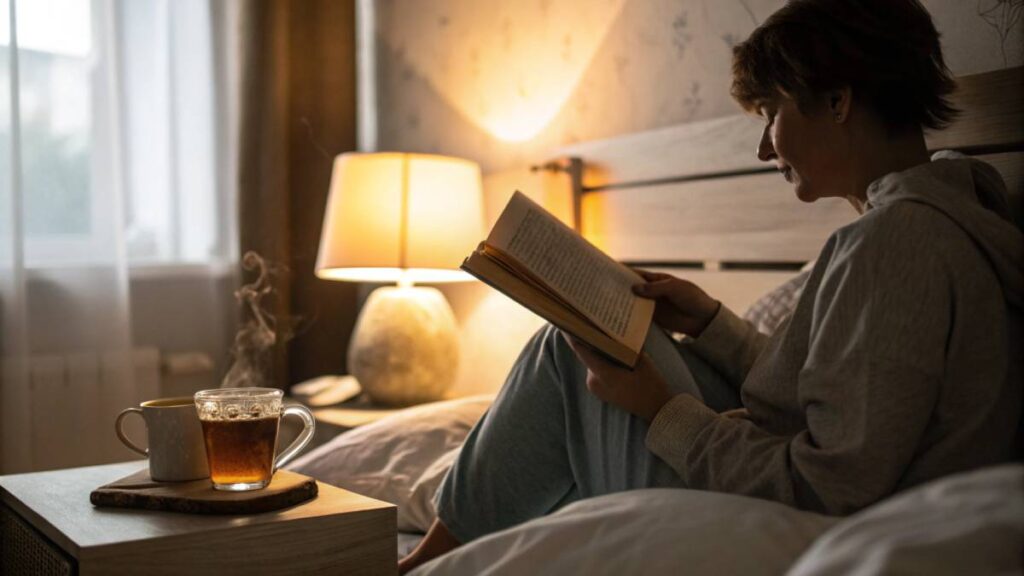
Bedtime Routine
A chill bedtime routine tells your body it’s time to relax and gear up for a good night’s sleep. Think about activities like reading, soaking in a warm bath, or trying out some calming exercises.
| Recommended Bedtime Activities | Purpose |
|---|---|
| Reading or journaling | Soothes the mind |
| Relaxation exercises | Stress buster |
| Warm bath | Cool down for faster snooze time |
Spending 30-60 minutes on these nightly rituals can make a noticeable difference. Throwing in a bit of meditation for sleep could also up your relaxation game.
Limiting Stimulants and Alcohol
Cutting back on coffee, cigarettes, and booze is crucial for better sleep. They can mess with your ability to doze off, and alcohol might mess up your sleep later in the night.
| Substance | Recommended Limitation |
|---|---|
| Caffeine | Steer clear 4-6 hours before bed |
| Nicotine | Avoid close to bedtime |
| Alcohol | Keep it moderate and not too late |
If you understand how these substances shake up your sleep, you can tackle insomnia. And if anxiety’s in the mix, knowing more about insomnia vs anxiety might help you rest easy.
By adopting these healthy sleep habits, like keeping your sleep schedule and bedtime routine locked down and cutting down on stimulants, you’re on the right track to better rest and beat insomnia.
Managing Stress and Anxiety
If counting sheep isn’t cutting it, maybe stress is the culprit behind your sleepless nights. For folks struggling with insomnia, a good stress-buster strategy can be a game-changer. Let’s check out some chill tactics to help you get some quality Z’s.
“You can’t always control what goes on outside. But you can always control what goes on inside.” – Wayne Dyer
Stress-Busting Tricks
Look, everyone deals with stress—even dogs get stressed, trust me! But we can sneak some zen into our daily grind with easy methods like deep belly breaths, un-knotting those muscles, or some easy-peasy yoga moves.
| Trick | What You Do | How Often |
|---|---|---|
| Deep Breathing | Inhale nice and slow, let out the tension with the exhale. | Every day |
| Muscle Un-knotting | Squeeze and release different muscles—you’ll melt like butter. | Several times a week |
| Easy Yoga | Stretch out with slow moves; good vibes only. | 2-3 times a week |
Mixing these into your day isn’t just good for stress—it’s like a VIP pass to snooze-ville.
Chill Out Before Hitting the Hay
Want to sleep like a log? Make bedtime your chill time. Dive into a good book, soak in a cozy bath, or jam out to mellow tunes; these are your brain’s cue to power-down. A nighttime chill session sets the stage for your body’s natural bedtime rhythm.
Here are some cool-down activities to try:
| Cools ya down, and calms ya up. | How Long | Why It Rocks |
|---|---|---|
| Warm Bubble Bath | 20-30 minutes | Smooth out the jagged edges. |
| Reading | 15-30 minutes | Bye-bye stress, hello peace. |
| Chill Tunes | 20-30 minutes | Smooths out the jagged edges. |
Got sleep troubles? Peek at our guide on how to beat the insomnia blues.
Mindfulness and Meditation Goodies
Mindful moments and meditation aren’t just hippie talk; they’re insomnia’s kryptonite. By tuning into now, you start forgetting the stuff that’s bugging you. Follow guided meditations or do a body scan, and watch the stress melt away.
| Practice | How Long | Where to Find It |
|---|---|---|
| Guided Meditation | 10-20 minutes | Apps, websites—it’s out there! |
| Body Scan | 10-15 minutes | All you need is your floor. |
If you’re up for it, check our piece on meditation for better zzz’s.
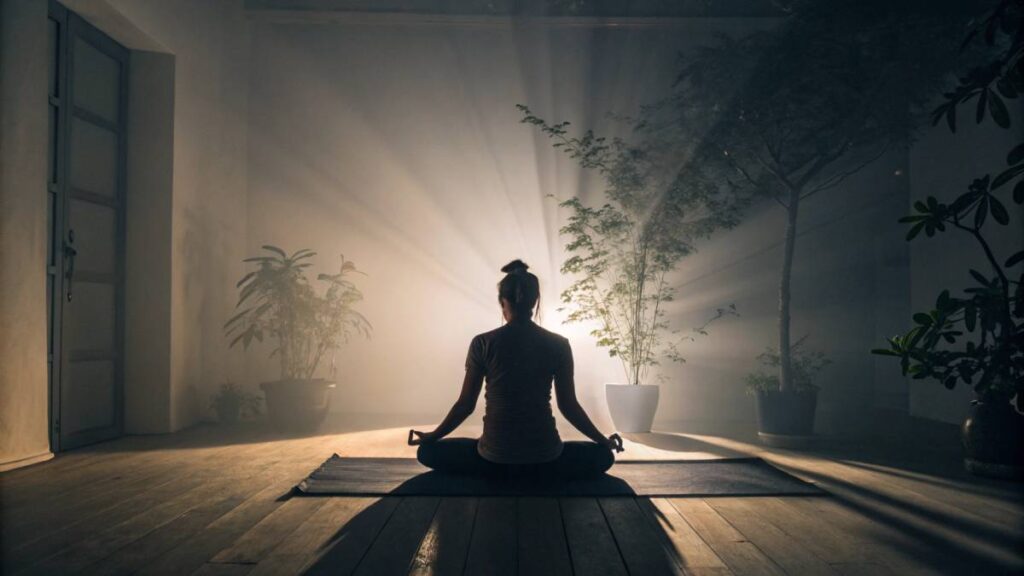
Jumping into these habits can have you flexing some sleep muscles you never knew you had. Sleep shouldn’t be the enemy—grab the reins and sleep tight!
Physical Activity and Diet
Benefits of Regular Exercise
Busting a move on the regular might be the secret weapon for a good night’s sleep. Getting active not only pumps up those feel-good vibes but also helps knock out stress and jitters that love to mess with our sleep. Plus, it just might let you snooze longer and wake up feeling like a new person. Here’s why you should shake a leg more often:
| Benefit | What’s the Big Deal |
|---|---|
| Kicks Anxiety to the Curb | Moving your body gets those happy hormones flowing, making you less stressed and anxious. |
| Keeps Sleep Patterns in Check | Sticking to a workout routine can get your body clock on track. |
| Adds More Z’s to Your Night | Active folks often find they sleep longer than the couch potatoes. |
| Makes Sleep Count More | Regular workouts mean deeper, invigorating sleep. |
For the lowdown on how workouts can be your best friend in fighting insomnia, head over to our piece on exercise for insomnia.

Balanced Diet for Better Sleep
What you munch on might just be the missing piece in your sleep puzzle. A balanced diet plays its part in slaying insomnia and ensuring you doze off with ease. Certain eats can tweak sleep hormones to dial down sleep troubles. Let’s chew over some diet must-haves for catching better Z’s:
- Complex Carbs: Whole grains rock the serotonin, easing you into a chill mode.
- Lean Meats: Chicken, turkey, or fish? They’re packed with amino acids that get those sleepy hormones going.
- Fruits and Veggies: Bananas and leafy greens have potassium and magnesium to ease those tense muscles and help you unwind.
Snack on these for a night of solid slumber:
| Food | Why It Rocks for Sleep |
|---|---|
| Almonds | Loaded with magnesium for sleep magic. |
| Kiwifruit | Antioxidants and serotonin team up to encourage nodding off. |
| Fatty Fish | Omega-3s and vitamin D? Yes, please, for sound slumber. |
| Herbal Tea | Sip some to unwind without the caffeine buzz. |
To dig deeper into which snacks can make your bed the happiest place, peek at our article on foods that help you sleep.
Technology and Sleep
In today’s tech-crazy world, it’s no wonder everyone’s buzzing about how all these gadgets mess with shut-eye. Getting the scoop on this could seriously help people fix their sleep woes.
Impact of Screens on Sleep
We’re glued to beeping gadgets from TVs to smartphones – lucky us! But all these screens throw off that sleep hormone, melatonin, thanks to the blue light they dish out. The outcome? Tossing and turning when you should be catching z’s.
Here’s a quick look at what each screen device can do to your slumber:
| Type of Screen | Impact on Sleep | Recommendations |
|---|---|---|
| Television | Could keep you up with late-night binges | Switch it off at a set time before hitting the sack |
| Computer | Bad news; long hours mess with melatonin | Power down at least an hour before bedtime |
| Smartphone | Big culprit; browsing before bed exposes you to sleep-stealing light | Use night mode, and stash it away before sleep |
| Tablets | Same deal as phones | Skip the bedtime scroll |
Curious about your nightly tossing? Check out our detailed tips on why can’t I fall asleep.
Importance of Unwinding from Technology
Building a get-ready-for-bed ritual that shoves gadgets aside can do wonders. Giving technology a break helps you wind down peacefully. Swap screen time with soothing activities.
Try these unwinding ideas:
- Chill with a good old-fashioned book
- Dip into relaxation methods like meditation or gentle stretching
- Groove to soft tunes or drift off to white noise
Wanna relax like a pro? Peek at our guide on meditation for sleep.
Especially for folks battling endless insomnia or stress-filled nights, these practices are gold. Crafting a bedtime routine with less screen time can be a game-changer on a savvy sleep hygiene checklist and lead you straight to dreamland.
Seeking Professional Help
When to Consult a Healthcare Provider
Can’t sleep? If you’ve been struggling with insomnia that refuses to go away, it might be time to have a chat with a healthcare provider. It’s a good idea, especially if you find yourself in any of these groups: folks with long-term sleep troubles, fresh parents juggling sleep (or lack thereof), night owls flipping between shifts, or older adults noticing those pesky aging effects on sleep. Here are some red flags to consider:
| Signs to Consult a Healthcare Provider | Description |
|---|---|
| Persistent Sleep Problems | Trouble catching those Z’s for over three weeks. |
| Daytime Dysfunction | Feeling wiped out, grumpy, or foggy during the day. |
| Underlying Health Issues | Medical issues that throw off the quality of your snooze time. |
| Dependence on Medication | Leaning on sleep aids to get any rest. |
Nipping sleep hiccups in the bud is a smart move. If you find yourself wondering why can’t I fall asleep, getting checked out might be your ticket to better sleep.
Therapeutic Options for Insomnia
There’s a bunch of ways to kick insomnia to the curb and catch more solid shut-eye. A few popular methods include:
| Therapy Type | Description |
|---|---|
| Cognitive Behavioral Therapy for Insomnia (CBT-I) | A step-by-step program to swap out thoughts and habits messing with your sleep. Wondering if does CBT-I work? Yep, it’s got some solid success for long-term relief. |
| Sleep Restriction Therapy | Cuts down bed time to boost how well you sleep. Curious? Check out our piece on sleep restriction therapy. |
| Relaxation Techniques | Tools like meditation for sleep that tackle stress and anxiety, those sleep robbers. |
| Medication | Sometimes, doctors might suggest short-term meds for tough cases. Chat through the ups and downs with them before diving in. |
Other routes? Consider exercise for insomnia and munching on sleep-boosting foods, which is all laid out in our write-up on foods that help you sleep. Getting the right help can flip the script on insomnia, leading to some well-deserved peace in dreamland.
Conclusion
“A good night’s sleep isn’t just a dream—it’s a reality within your reach. By creating a consistent sleep schedule, curating a calming environment, and managing stress mindfully, you can reset your body and mind for restful nights and energetic days. If insomnia still lingers, don’t hesitate to seek professional support. Take control of your nights; your mornings will thank you!
FAQs
What is sleep hygiene?
Sleep hygiene refers to the habits and environmental factors that promote quality sleep.
How can I create a sleep-friendly environment?
Keep your bedroom dark, quiet, cool, and free from distractions like phones and TVs.
Does exercise help with sleep?
Yes, regular physical activity regulates sleep cycles and reduces anxiety, aiding better sleep.
When should I seek professional help for sleep issues?
If insomnia persists for more than three weeks or affects your daily functioning, consult a healthcare provider.
Can caffeine or alcohol affect my sleep?
Absolutely! Avoid caffeine 4–6 hours before bedtime and moderate alcohol consumption earlier in the evening.

